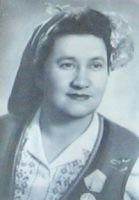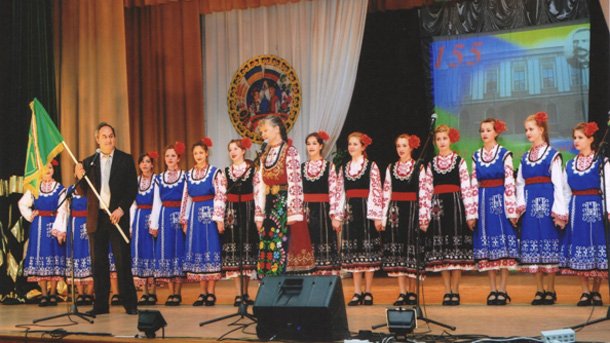
One of the most renowned Bulgarian folk singers is Mita Stoicheva (1909-1976). For 4 decades she performed at the stages in Bulgaria and turned the folk songs from her Veliko Tarnovo region into popular songs, known by all Bulgarians. Even today young singers continue to learn from the recordings of Mita Stoicheva, characterized by her crystal clear voice.
“Mita Stoicheva has a gift not only to interpret but also to develop and enrich the folk song. Her voice is soft, warm, and touching,” writes about her folklorist Elena Stoin.
She is one of the voices, that presented Bulgaria in the 1954 LP of American company Columbia, entitled "World Library of Authentic Folk Music.” Mita Stoicheva has also collected and recorded about 400 authentic songs.
Born in the village of Mekish in Northern Bulgaria, Mita Stoicheva started listening to her mother's songs as a child. At school her musical talent was quickly noticed. Teacher Alexander Petkov urged Mita’s parents to send her to a school of music, but her father could not be persuaded and he made Mita marry at the age of 16. Despite the hard work at home and on the field, Mita Stoicheva’s singing continued to receive recognition from the rural audience. And when she decided to appear at a music contest the success quickly came. Evidence of that time gives us a record of the Golden Fund of the Bulgarian National Radio.
“It was the day when my dreams came true,” recalls Mita Stoicheva. “In 1939, a large gathering was held in Northern Bulgaria. I was invited by the municipality and went to the folk gathering with others. There were singers, bagpipers, and musicians from various regions. On the third day it was my turn to sing. Listening to other singers I was thinking if they were better than me. I was confident in my singing and took the first prize. I received many letters, too. In 1940 the "Microphone" company called me to record an LP. My husband and I stayed for a month in Sofia and I recorded 30 songs. In 1941 we recorded 30 more songs and in 1946 I became a regular collaborator of Radio Sofia.”
Mita Stoicheva did not know the music notes and learned hundreds of songs through listening. Most of them are kept in the audio fund of the BNR. The singer moved to Sofia in 1954 and established the "Our Song” Band together with famous singers of that time, staging thousands of concerts at home and abroad.

One of the most beloved and famous Bulgarian bagpipers is Krassimir Kondov. Recently he celebrated his 50th birthday with teachers and friends in the warm atmosphere of the "G.S. Rakovsky" School in Bolgrad, Bessarabia, Ukraine. There he teaches Bulgarian folk music. In 2002, after a contest organized by the Ministry of Education, Kondov went there for four years as a teacher of singing. For the needs of his vocal ensemble "Zdravetz" he teaches musicians to play Bulgarian folk instruments, too. He also established the "Bessarabia" professional orchestra at the Culture Center in Bolgrad.
There are many holidays in Bolgrad, but for me the most interesting are those that are purely Bulgarian. They have been preserved by the Bulgarian settlers who moved here 200 years ago- says Krasimir Kondov. - Their descendants today speak archaic Bulgarian language that has survived through the centuries, thanks to which folklore is also preserved. Academician Nikolai Kaufman has studied this ancient Bulgarian folklore in two volumes. Unfortunately, over time, some patterns have been "blurred" due to musical influences from neighboring Romania and Moldova. One of my tasks was to return to the original sound of the folk melodies.
Krasimir Kondov was born on May 7, 1963 in Varna, in a family with traditions in folklore music. He began to study bagpipe as a child and won his first prizes and gold medals as an artist at that age. During his high school years in the Music School in Kotel, he was selected to play in the assembly for gifted children "Banner of Peace" in Sofia. Later in Plovdiv, where he completed his higher education in music, he became a soloist of the representative orchestra of the Academy. He developed the ability to arrange and write his own songs based on folklore and made his first recordings for Radio Plovdiv and Sofia. Since 1994 Krasimir Kondov has been a bagpipe teacher at the music school in Pleven, which also runs a vocal ensemble and orchestra. He has also worked as lecturer in the New Bulgarian University.

© Photo: private archive
His art is known outside Bulgaria. Krasimir Kondov has visited folklore forums in Spain, Germany, UK, Austria, Greece and Russia. His work includes 250 arrangements of folk music and a number of songs for a trio, quartet, and choir.
Krasimir Kondov bagpipe sounds even in the CD of Norwegian Stian Karlstensen entitled, "The Spirit of Bulgaria," Marcel Cellier’s "The Mystery of Bulgarian Voices" and others. In 2006, the musician released a solo album, "The Bagpipe."
English version: Alexander Markov
Strykers, a band known for their original approach to melodic hard rock, continue to follow their creative vision. Their latest release, featuring Gergana Stoyanova and Leon Daniel, is dedicated to the earth and the children of tomorrow. The title says..
A concert in Los Angeles with an all-Bulgarian programme dedicated to the National Day of March 3 will take place in the City of Angels in a few days, on March 21. This was announced by the famous film composer Penka Kuneva in an interview with Radio..
On March 17, the Sofia Philharmonic Orchestra and its principal conductor Nayden Todorov will once again perform at the legendary Wiener Musikverein Golden Hall in Vienna, Austria. Maestro Todorov will conduct Nino Rota's Concerto for Trombone and..

+359 2 9336 661
